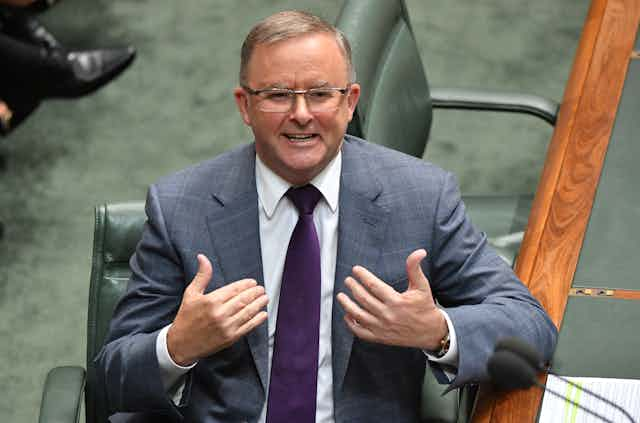An “unholy coalition” is attacking the planned increase in the superannuation guarantee, Opposition Leader Anthony Albanese says in his latest “vision statement”, pledging to resist any attempt to stop the legislated rise to 12% going ahead.
In a speech on older Australians – released ahead of Wednesday’s delivery in Brisbane – Albanese says critics “want to see super wound back or abolished. They say that the pension should be enough, or that it reduces wages.
"I absolutely reject this binary approach. With economic growth and productivity you can have both higher super and higher wages.”
The rise in the guarantee, at present 9.5%, would take it in increments to 12% by 2025. The increase has strong critics within government ranks (where some would favour making superannuation voluntary) and outside, among them the Grattan Institute. The government has an inquiry into retirement incomes running.
The Australian Council of Social Service has argued that “any increase in compulsory retirement saving above 10% of wages should be based on a careful assessment of the needs of low and middle-income workers before and after retirement”.
ACOSS also says the guarantee should not rise above 10% until tax breaks for super contributions are reformed to make them fair.
Interviewed on Sky on Tuesday, government senator Gerard Rennick, from Queensland, agreed there was a growing push among Liberals to stop the increase.
Albanese says the prescriptions of ACOSS and others play into the government’s hands.
Supporting the guarantee going to 12%, he says: “Having established the superannuation system we will not stand by and see it chipped away. We want to make it better.”
In his speech Albanese also says a Labor government would charge its proposed body Jobs and Skills Australia with strengthening the workforce for the aged care sector.
This is one of “the workforces of the future”, and needs proper pay and training to be able “to provide culturally and linguistically appropriate care”.
Albanese attacks the government’s plan to privatise aged care assessments. “The first interaction the elderly and their families have with the aged care system is through an aged care assessment or ACAT. It is the first step to getting a home care package or entering a residential aged care facility.
"Our aged care system is broken – and this government wants to make it worse by subjecting ACAT to the indifference of the market. There is a role for the market. But markets have no conscience.”
Albanese also endorses the concept of “intergenerational care”.
“The ABC program ‘Old People’s Home for 4 Year Olds’ made me laugh and made me cry – but it also made me imagine a future where intergenerational care is the answer to our aged care crisis.
"Imagine a future where we co-locate aged care facilities including day respites with kinders and preschools.
"Day respite for our elderly is a missing piece of the puzzle. For many families, they want mum or dad to stay at home or live with them, but they worry about the long days when they are at work.
"Imagine being able to drop your child and grandmother off to the same location.
"Imagine knowing their day would be enjoyable and safe, with activities led by well-paid staff.
"The benefits of intergenerational care are immense. It can help our elderly re-engage with the world, minimise their isolation and the effects of their health issues.”
On the issue of older workers who have trouble getting jobs, Albanese says the answer for some is “to upgrade their skills, which underscores the urgency of rebuilding our TAFEs in particular and our VET system in general”.
But cultural change is also needed, he says, and employers must play their part.
“According to Deloitte Access Economics, a 3% increase in workforce participation by Australians aged over 55 would generate a A$33 billion boost to the economy each year.
"Volunteering is great. But to build a stronger economy we must harness the talents of everybody - and that includes older Australians who are sources of wisdom and experience for their employers and co-workers.”

